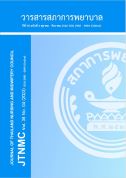Effects of Game-Based Learning in Caring for Patients with Intercostal Drainage on Knowledge, Practical Skills, and Satisfaction in Nursing Students
DOI:
https://doi.org/10.60099/jtnmc.v38i04.265587Keywords:
game-based learning, intercostal drainage, knowledge, nursing practice skills, satisfaction, nursing studentAbstract
Introduction In the 21st century, the pedagogy of teaching and learning has transitioned towards self-directed learning, aiming to motivate learners while enhancing the link between theoretical knowledge, and clinical practice skills. Gamification, known as game-based learning, is increasingly emerging as a strategy to complement simulation-based approaches. Proficiency in caring for patients with intercostal drainage is vital for both life-saving and acute care, highlighting the need for effective teaching, and learning methodologies.
Objectives This study aimed to examine the effect of game-based learning on knowledge and skills related to caring for patients undergoing thoracic drainage, and satisfaction with game-based learning in nursing students.
Design This research employed a one-group pretest-posttest quasi-experimental design, using cognitive constructivism, and game-based learning as the research framework.
Method A total of 108 third-year nursing students voluntarily participated in a one-month game-based computer-assisted learning program titled “Fun Games: Awakening ICD Knowledge.” The research instruments included a knowledge questionnaire (CVI =.99, KR-20 =.70), an objective structured clinical examination (OSCE) (CVI =.99, Inter-rater reliability = 1.0), and a questionnaire on satisfaction with game-based learning (CVI =.99, Cronbach’s alpha coefficient =.90). Data were analyzed using descriptive statistics and Paired t-tests.
Results After the game-based learning, knowledge scores (M = 7.01, SD = 1.14) were significantly higher than pre-test scores (M = 5.12, SD = 1.77, t=-10.153, p < .001). All nursing students successfully passed the OSCE examination. Overall satisfaction with game-based learning was at a high level (M = 4.37, SD = 0.62).
Recommendation Game-based learning facilitates nursing students in acquiring knowledge and skills related to caring for patients with intercostal drainage, and their satisfaction reflects the need for an enhanced strategic pedagogical approach that aligns with current educational trends. It is recommended to further utilize and develop this learning method as an integrated approach to bridge theoretical knowledge with nursing practice courses.
Downloads
References
Chevalère J, Cazenave L, Berthon M, Martinez R, Mazenod V, Borion MC, Pailler D, Rocher N, Cadet R, Lenne C, Maïonchi-Pino N, Huguet P. Computerassisted instruction versus inquiry-based learning: The importance of working memory capacity. PLoS One. 2021 Nov 9;16(11):e0259664. doi. org/10.1371/journal.pone.0259664
Fuster-Guilló A, Pertegal-Felices ML, JimenoMorenilla A, Azorín-López J, Rico-Soliveres ML, Restrepo-Calle F. Evaluating impact on motivation and academic performance of a game-based learning experience using kahoot. Front Psychol 2019;10: 2843. doi.org/10.3389/fpsyg.2019.02843
Shorey S, Ng ED. The use of virtual reality simulation among nursing students and registered nurses: A systematic review. Nurse Educ Today 2021;9810 4662. doi:10. 1016/j.nedt.2020.104662. doi.org/10.1016/j. nedt.2020.104662
Binbai S, Thanamai S. Computer games with learning in digital age. Technical Education Journal KMUTNB [Internet]. 2014 Jan- June [cited 2023 Sep. 23];5(1): 177-82. Available from: https://ojs.kmutnb.ac.th/index.php/jote/article/view/3205/2502. (in Thai).
All A, Castellar EP, Van Looy J. Towards a conceptual framework for assessing the effectiveness of digital game-based learning. Comput Educ 2015;1(88): 29-37. doi.org/10.1016/j.compedu.2015.04.012
Piaget J. The Psychology of Intelligence. 2nd ed. London: Routledge; 2001
Amineh RJ, Asl HD. Review of constructivism and social constructivism. Journal of Social Sciences, Literature and Languages [Internet]. 2015 April. 30 [cited 2023 Sep. 23];1(1):9-16. Available from: https://kku.world/ns4sa.
Tavares N. The use and impact of game-based learning on the learning experience and knowledge retention of nursing undergraduate students: A systematic literature review. Nurse Educ Today 2022; 27:105484. doi.org/ 10.1016/j.nedt.2022.105484
Chaeye K, Thammajinda O-A. Effects of enjoyable obstetrics online game on knowledge and satisfaction of learners. J NAT North [Internet]. 2020 Jun. 30 [cited 2023 Sep. 23]; 26(1):54-65. Available from: https://he01.tci-thaijo.org/index.php/jnorthnurse/article/view/238584. (in Thai).
Anankittikul A, Phungphae P. Digital games-based learning in teaching social studies.Journal of Education, Silpakorn University [Internet]. 2022 Jan-Jun [cited 2023 Sep. 23]; 20(1):104-16. Available from: https://so02.tci-thaijo.org/index.php/suedujournal/article/view/241978/173432. (in Thai).
Srisaard B. Statistic for research. 5thed. Bangkok: Surivittayasarn; 2014. (in Thai).
Khon Kaen University. SPSS statistics for windows, stata relestata10. [Internet]. [cited 2023 Sep 23]. Available from: https://digital.kku.ac.th/?page_id=641.
Thongpradab J, Lohacheewa S, Preeyanon L. Effects of Game-Based Learning on Nursing Students’ Knowledge of English Psychiatry Terminology. JTNMC [Internet]. 2022 Dec. 3 [cited 2023 Sep. 23];37(04):111-24. Available from: https://he02.tci-thaijo.org/index.php/TJONC/article/view/257405. (in Thai).
Srinathiyawasin T. Teaching and learning method through game-based activity towards the achievement of student. JMPR [Internet]. 2021[cited 2023 Sep. 23]; 7(3): 40-55. Available from: https://so05.tci-thaijo.org/index.php/Palisueksabuddhaghosa/article/view/253003. (in Thai).
Jutamaneeroj D, Songkarm M. Development of web application using decision based learning to enhance pre-clinic medical students evaluate reasoning. JETC [Internet]. 2022[cited 2023 Sep. 23];5(14): 36-46. Available from: https://so02.tci-thaijo.org/index.php/etcedumsujournal/article/view/253096/172550. (in Thai).
Sakulprahmne S, Prasittichok P. Development of a game application for team-based learning to enhance 21st century skills of undergraduate students. JIL 2022;33(1): 1-10. Available from: https://so04.tci-thaijo.org/index.php/jil/article/download/255946/174833/963961. (in Thai).
Downloads
Published
How to Cite
Issue
Section
License
Copyright (c) 2023 The Journal of Thailand Nursing and Midwifery Council

This work is licensed under a Creative Commons Attribution-NonCommercial-NoDerivatives 4.0 International License.








